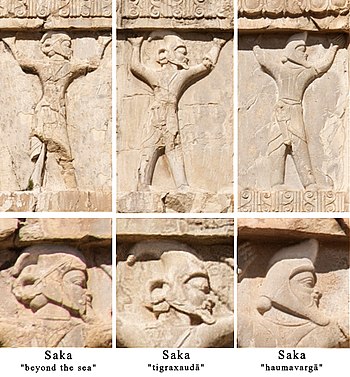𐎿𐎣𐎡𐎲𐎡𐏁 𐏐 𐎫𐎹𐎡𐎹 𐏐 𐎱𐎼 𐏐 𐎿𐎢𐎥𐎭𐎶
Appearance
Old Persian
[edit]
Etymology
[edit]Literally means "Scythians who live beyond Sogdiana", from 𐎿𐎣𐎡𐎲𐎡𐏁 (s-k-i-b-i-š /Sakaibiš/, “Scythians, Sacaeans”) + 𐎫𐎹𐎡𐎹 (t-y-i-y /tayaiy/, “who, which”) + 𐎱𐎼 (p-r /para/, “beyond”) + 𐎿𐎢𐎥𐎭𐎶 (s-u-g-d-m /Sugdam/, “Sogdiana”),[2] in reference to them living beyond Sogdiana with respect to the Achaemenid Empire.
Compare:
- 𐎿𐎣𐎠 𐏐 𐎫𐎹𐎡𐎹 𐏐 𐎱𐎼𐎭𐎼𐎹 (Sakā tayaiy paradraya, literally “Scythians who live across the Sea”)
- 𐎿𐎣𐎠 𐏐 𐎫𐎡𐎥𐎼𐎧𐎢𐎭𐎠 (Sakā tigraxaudā, literally “Scythians with pointed caps”)
- 𐎿𐎣𐎠 𐏐 𐏃𐎢𐎶𐎺𐎼𐎥𐎠 (Sakā haumavargā, literally “Scythians who lay hauma-plants around (the fire)”)
Proper noun
[edit]𐎿𐎣𐎡𐎲𐎡𐏁 𐏐 𐎫𐎹𐎡𐎹 𐏐 𐎱𐎼 𐏐 𐎿𐎢𐎥𐎭𐎶 (s-k-i-b-i-š : t-y-i-y : p-r : s-u-g-d-m /Sakaibiš tayaiy para Sugdam/)
- A group of Scythians from Central Asia
- DH
- 𐎭𐎠𐎼𐎹𐎺𐎢𐏁 𐏐 𐏋 𐏐 𐎺𐏀𐎼𐎣 𐏐 𐏋 𐏐 𐏋𐎹<𐎠>𐎴𐎠𐎶 𐏐 𐏋 𐏐 𐎭𐏃𐎹𐎢𐎺𐎴𐎠𐎶
𐏐 𐎻𐎡𐏁𐎫𐎠𐎿𐎱𐏃𐎹𐎠 𐏐 𐎱𐎢𐏂 𐏐 𐏃𐎧𐎠𐎶𐎴𐎡𐏁𐎡𐎹 𐏐
𐎰𐎠𐎫𐎡𐎹 𐏐 𐎭𐎠𐎼𐎹𐎺𐎢𐏁 𐏐 𐏋 𐏐 𐎡𐎶 𐏐 𐎧𐏁𐏂𐎶 𐏐 𐎫𐎹 𐏐 𐎠𐎭𐎶
𐏐 𐎭𐎠𐎼𐎹𐎠𐎷𐎡𐎹 𐏐 𐏃𐎨𐎠 𐏐 𐎿𐎣𐎡𐎲𐎡𐏁 𐏐 𐎫𐎹𐎡𐎹 𐏐 𐎱𐎼
𐏐 𐎿𐎢𐎥𐎭𐎶 𐏐 𐎠𐎶𐎫 𐏐 𐎹𐎠𐎫𐎠 𐏐 𐎠 𐏐 𐎤𐎢𐏁𐎠 𐏐 𐏃𐎨𐎠 𐏐 𐏃𐎡𐎭𐎢𐎺
𐏐 𐎠𐎶𐎫 𐏐 𐎹𐎠𐎫𐎠 𐏐 𐎠 𐏐 𐎿𐎱𐎼𐎭𐎠 𐏐 𐎫𐎹𐎶𐎡𐎹 𐏐 𐎠𐎢𐎼𐎶𐏀𐎭𐎠
𐏐 𐎳𐎼𐎠𐎲𐎼 𐏐 𐏃𐎹 𐏐 𐎶𐎰𐎡𐏁𐎫 𐏐 𐎲𐎥𐎠𐎴𐎠𐎶 𐏐 𐎶𐎠𐎶
𐏐 𐎠𐎢𐎼𐎶𐏀𐎭𐎠 𐏐 𐎱𐎠𐎬𐎢𐎺 𐏐 𐎢𐎫𐎠𐎶𐎡𐎹 𐏐 𐎻𐎡𐎰𐎶- d-a-r-y-v-u-š : XŠ : v-z-r-k : XŠ : XŠ-y<𐎠>n-a-m : XŠ : d-h-y-u-v-n-a-m
: vi-i-š-t-a-s-p-h-y-a : p-u-ç : h-x-a-m-n-i-š-i-y :
θ-a-t-i-y : d-a-r-y-v-u-š : XŠ : i-m : x-š-ç-m : t-y : a-d-m
: d-a-r-y-a-mi-i-y : h-c-a : s-k-i-b-i-š : t-y-i-y : p-r
: s-u-g-d-m : a-m-t : y-a-t-a : a : ku-u-š-a : h-c-a : h-i-d-u-v
: a-m-t : y-a-t-a : a : s-p-r-d-a : t-y-m-i-y : a-u-r-m-z-d-a
: f-r-a-b-r : h-y : m-θ-i-š-t : b-g-a-n-a-m : m-a-m
: a-u-r-m-z-d-a : p-a-tu-u-v : u-t-a-m-i-y : vi-i-θ-m - /Dārayavauš : XŠ : vazraka : XŠ : XŠyanām : XŠ : dahyūvnām
: Vištāspahyā : puça : Haxāmanišiya :
θātiy : Dārayavauš : XŠ : ima : xšaçam : tya : adam
: dārayāmiy : hacā : Sakaibiš : tayaiy : para
: Sugdam : amata : yātā : ā : Kūšā : hacā : Hidauv
: amata : yātā : ā : Spardā : tyamaiy : Auramazdā
: frābara : hya : maθišta : bagānām : mām
: Auramazdā : pātuv : utāmaiy : viθam/
Darius the Great King, King of Kings, King of Countries,
son of Hystaspes, an Achaemenian.
Saith Darius the King: This is the kingdom which I
hold, from the Scythians who are beyond
Sogdiana, thence unto Ethiopia; from India,
thence unto Libya - which Ahuramazda
the greatest of the gods bestowed upon me. Me
may Ahuramazda protect, and my royal house.
- d-a-r-y-v-u-š : XŠ : v-z-r-k : XŠ : XŠ-y<𐎠>n-a-m : XŠ : d-h-y-u-v-n-a-m
References
[edit]- ^ "HAUMAVARGĀ" in Encyclopædia Iranica, December 15, 2003
- ^ Lexicon
- Text: DH, Part No. 61, Old Persian Corpus, TITUS: Thesaurus Indogermanischer Text- und Sprachmaterialien

